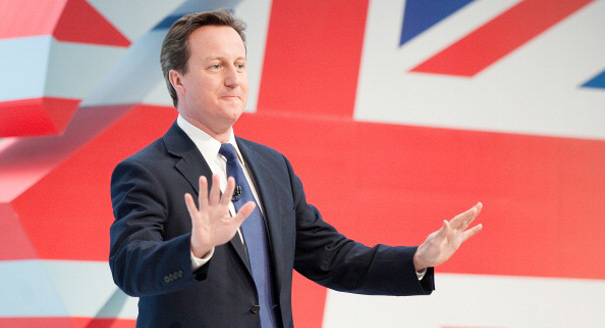For Irish Europhiles, the election of Jeremy Corbyn on September 12 as the new radical left-wing leader of Britain’s opposition Labour Party might just offer a glimmer of hope.
Not that his campaign to become Labour leader was reassuring for those who want Britain to remain a serious foreign policy player in Europe. Corbyn didn’t hide his disdain for NATO, for U.S. foreign policy, or for Britain’s involvement in the U.S.-led invasion of Iraq in 2003—or his disparaging views about Europe.
But at least Corbyn, to the relief of the pro-European wing of his party, says he wants Britain to stay in the EU, and will fight for that—unlike the Conservative Prime Minister David Cameron.
Cameron refuses to say what he believes in and what he wants. His pandering to the Euroskeptic wing of his party and the growing populist sentiment in the country is doing nothing to weaken the possibility that under his leadership, the UK could leave the EU. Indeed, Cameron seems more afraid of his own Euroskeptic parliamentary backbenchers—even though they owe it to him for winning a landslide victory in the May 2015 general election—than of the strategic fallout of a so-called Brexit.
To make matters worse for the small pro-EU Conservative lobby, Europe’s ongoing refugee crisis has become manna for the anti-EU camp, especially the populist UK Independence Party. It wants Britain to leave the EU lock, stock, and barrel—which no doubt Russia would relish, because it would further weaken the EU.
A Brexit would be bad for Britain. It would be bad for Europe. And it would be particularly bad for Ireland, for which the geostrategic and security implications of a British exit must not be underestimated. But that doesn’t seem to be on Cameron’s radar screen.
A Brexit would bring many uncertainties for Ireland. One is the future sustainability of the Northern Ireland peace process. Both Northern Irish Unionists, who remain loyal to Britain, and those hard-nosed Republicans who want reunification with the Irish Republic could use a Brexit for their own ends.
#Cameron refuses to say what he believes in and what he wants.Tweet This
As it is, the government in Dublin is watching very closely Britain’s plans for further devolution in Scotland and Wales and the impact those plans could have on Northern Ireland.
Furthermore, a Brexit would create immense political and economic technical difficulties for the EU’s free movement of persons, capital, goods, and services between Ireland and the UK, and between Ireland and Northern Ireland. Could London and Dublin really envisage reestablishing border controls, customs posts, and other new divisions between Britain and Ireland?
There would also be uncertainty over the special relationship forged between Dublin and London over the past decade. Just recall the extraordinary welcome Britain’s Queen Elizabeth II received in 2011 when she made the first-ever visit to an independent Ireland by a British monarch.
All these uncertainties have fueled a genuine sense of unease about Ireland’s future relationship with Britain. The two countries joined the then European Economic Community at the same time in 1973. Ireland could not go it alone because it depended so much on Britain as its main trading partner. Britain could not go it alone because of the conflict between Unionists and Republicans in Northern Ireland, which was at its peak in the 1970s.
EU membership and the tremendous support of the former U.S. president Bill Clinton gave Dublin and London special psychological and political backing to sign the 1998 Good Friday Agreement, which formally ended the conflict in Northern Ireland. Yet now, Cameron seems to be turning his back on all these achievements.
No wonder the Irish government is extremely worried about a Brexit and the implications for stability. This is confirmed in Ireland’s latest White Paper on Defence that was published in August 2015. The chapter entitled Domestic Environment Assessment makes for sober reading. It states that the Good Friday Agreement has delivered a stable peace process that commands overwhelming cross-community support.
“Nonetheless,” the report adds, “there is a real and persistent threat from groups who are prepared to use violence in order to oppose democracy and peace. . . . Whilst the threat from these groups to this State remains low, it is still classed as severe in Northern Ireland.”
#Brexit would be bad for Britain, bad for Europe, and bad for #Ireland.Tweet This
Indeed, over the past several months, dissident groups affiliated to the Irish Republican Army (IRA) have carried out attacks, a reminder of how the Good Friday Agreement needs constant nurturing.
The Irish government’s latest annual National Risk Assessment, which was published in 2014, spelled out the dangers of a Brexit for Ireland: “A withdrawal of the UK from the European Union, or a period of continuing uncertainty regarding the UK’s relationship with the EU would present significant challenges in terms of (i) pursuit of Ireland’s objectives as a Member State; (ii) bilateral relations with the UK including the economic and trading relationship; (iii) Northern Ireland issues.”
Such are the geostrategic implications of Britain leaving the EU that Cameron prefers his stance to remain unsaid and unheard. Now wouldn’t it be reassuring if Corbyn broke that silence?










